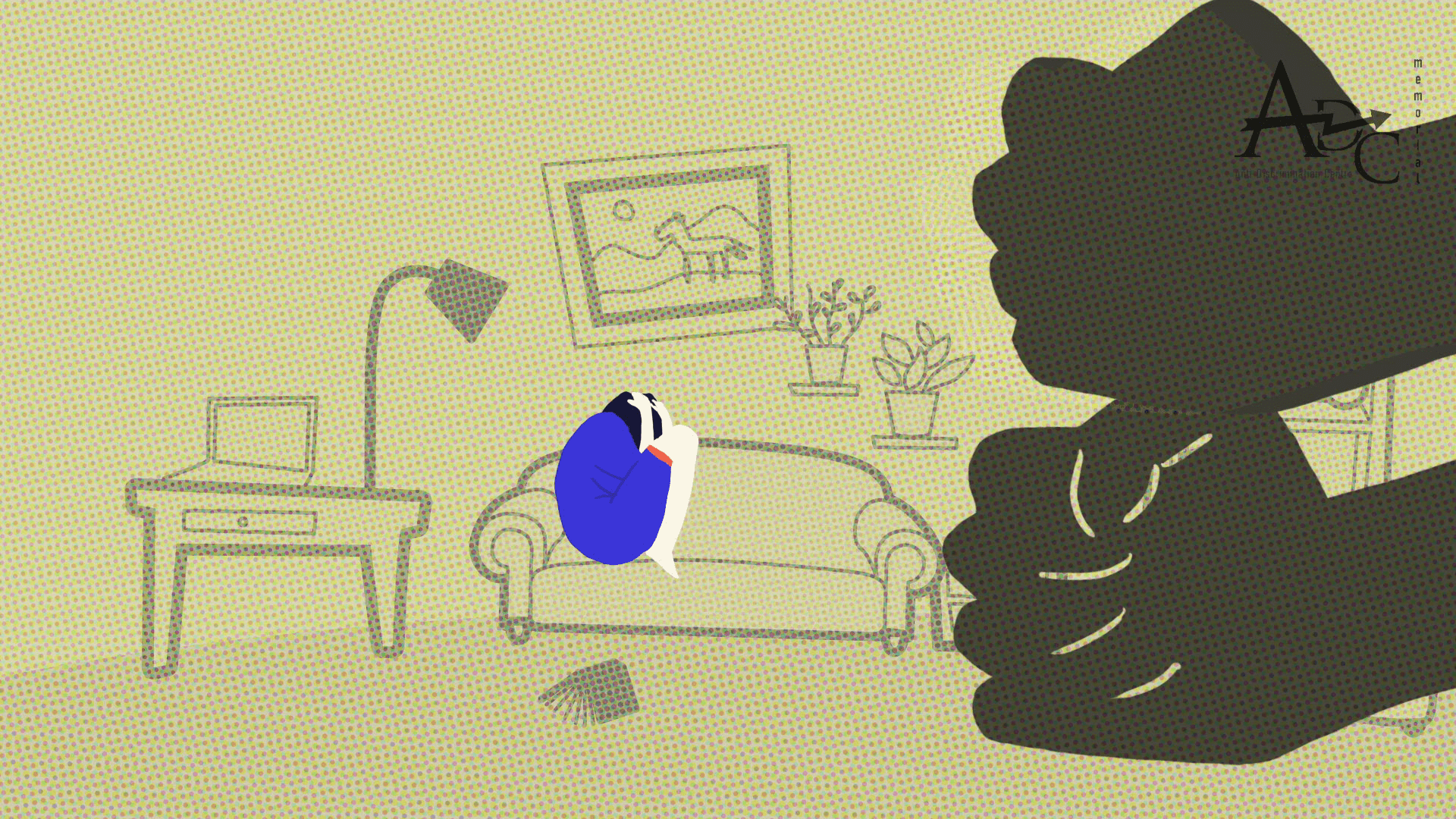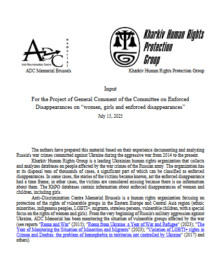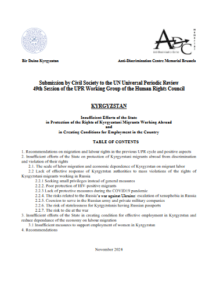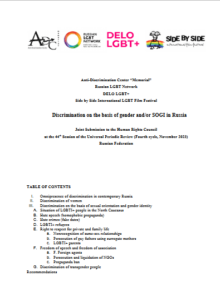In the three years since the launch of the #AllJobs4AllWomen campaign, three countries have fully repealed legally enshrined professional bans for women and several countries have opened access to hundreds of specializations for women. Women have already started working and realizing their careers in hundreds of jobs that were banned to them for over 40 years.
Table of Content
- Countries that have repealed lists of professions banned for women: Armenia and Georgia, Moldova, Ukraine, Uzbekistan
- Countries that have revised their lists of banned professions and partially lifted some bans: Russia, Kazakhstan, Belarus, Kyrgyzstan
- Deepening of entrenched stereotypes: Turkmenistan, Tajikistan, Azerbaijan
In March 2017 ADC Memorial launched the campaign #AllJobs4AllWomen against restrictions on professions for women in Eastern European and Central Asian countries. At that time, gender-related bans on employment affected hundreds of jobs, including prestigious and high-paying jobs, in 10 countries in the region. Lists of professions banned for women, a relic of the Soviet era, legitimized employment discrimination against women, justifying this with concerns about their “reproductive function.”
The cancellation and revision of these lists were achieved by the women themselves, the heroines of this campaign, who were vocal in their fight for the right to work in their chosen professions, and through cooperation with unions and deputies. In addition, human rights defenders have repeatedly pointed out to UN experts (the Committee on the Elimination of All Forms of Discrimination Against Women and the Committee on Economic, Social and Cultural Rights) that gender-based bans on employment violate international agreements and conventions and have recommended that these bans be recognized as discrimination.
An important step towards the cancellation of bans on professions was the decision of UN CEDAW in the case of Svetlana Medvedeva (2016)1Views of the Committee on the Elimination of Discrimination against Women under article 7 (3) of the Optional Protocol to the Convention on the Elimination of All Forms of Discrimination against Women (sixty-third session) concerning Communication No. 60/2013 http://tbinternet.ohchr.org/_layouts/treatybodyexternal/Download.aspx?symbolno=CEDAW/C/63/D/60/2013&Lang=en , which recommended that countries in the region repeal the lists of banned professions and grant women the right to choose their own careers.
The Committee is of the view that the introduction of such legislation reflects persistent stereotypes concerning the roles and responsibilities of women and men in the family and in society that have the effect of perpetuating traditional roles for women as mothers and wives and undermining women’s social status and their educational and career prospects. No evidence has been provided to the Committee that the inclusion of the position of helmsperson-motorist in the list of prohibited jobs is based on any scientific evidence that it may be harmful to women’s reproductive health. The Committee observes that the adoption of a list of 456 occupations and 38 branches of industry contradicts the State party’s obligations under the Convention because it treats men and women differently, it in no way promotes the employment of women and it is based on discriminatory stereotypes
From the CEDAW decision (2016) in the case of Svetlana Medvedeva, who couldn’t finish her education and work as ship navigator due to the list of professions banned for women
Countries that have repealed lists of professions banned for women
Armenia and Georgia
In adapting their laws to European standards, the governments of Georgia and Armenia cancelled their lists of banned professions, but left parts of them in effect for several groups of women: pregnant women (both countries), mothers of children under the age of one (Armenia), and nursing mothers.
At the same time, in Armenia the employer has been obliged to determine the duration and the character of exposure to hazards affecting the safety and health of pregnant women. And labor standards in Georgia do not provide for the transfer of women of special categories from harmful and dangerous jobs to safe for their health and the health of their child. The result of such prohibitions is predictable: the employer will deny employment to women both for lack of clear rules, cost obligations and fear of sanctions for hiring the “prohibited” category.
Moldova
On August 25, 2017, just six months after the launch of the campaign, Moldova became the first country to change its Labor Code. New norms providing additional rights for pregnant women and new and nursing mothers were added to the code. These norms included the possibility to transfer temporarily to a job safe for their situation with retention of salary, to reject overnight work, and to switch to a part-time workday or workweek.
In an alternative report for CEDAW, ADC Memorial noted that Moldova must do more to inform both potential workers and employers that the bans have been lifted.
However, it is important to note the general lack of awareness of the fact that hundreds of previously banned professions have been opened to women. Even state workers and gender rights experts were not properly notified of the amendments, to say nothing of potential female workers themselves.
Alternative information by ADC Memorial on Moldova’s implementation of the UN Convention on the Elimination of All Forms of Discrimination Against Women for the 75th Session of the CEDAW
Ukraine
On December 21, 2017, nine months after the start of the campaign, Ukraine repealed its discriminatory list, which banned women from over 450 jobs.
This was achieved thanks to the efforts of human rights defenders in cooperation with Ulana Suprun, who was acting minister of health at the time and Svitlana Voytsekhovska, a people’s deputy in the Verkhovna Rada, who came out strongly in favor of repealing the list.
Human rights defenders continue to work towards amendments to the Labor Code regarding expansion of the rights of pregnant women and new mothers and towards the cancellation of an irrelevant article banning women’s employment in certain positions.
CESCR experts have asked Ukraine to detail specific steps it is taking to promote training and employment for women seeking previously banned jobs. Human right defenders have noted that neither women nor employers have not been sufficiently informed about the removal of the bans (for example, women are not widely invited to apply for jobs as train, metro, or bus operators).
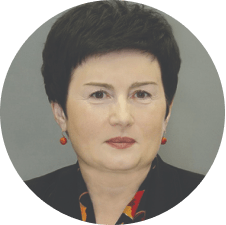
We should not be banning professions for women, but creating conditions for them to work. And they should be able to choose for themselves if they want to fly planes or operate underground trains.
Uzbekistan
Uzbekistan repealed its list in March 2019, two years after the campaign’s launch, and women gained the opportunity to work in 477 previously banned specializations on May 1, 2019. Lawmakers also made amendments to the Labor Code that repealed any professional bans on the basis of gender, expanded measures to support working parents (both mothers and fathers), and established additional guarantees for gender equality in employment and women’s rights.
Countries that have revised their lists of banned professions and partially lifted some bans
Several countries in the region have already curtailed their lists of banned professions or have at least attempted to broaden the employment sector and opportunities for professional realization for women by providing them with the opportunity to work in certain sectors, including ones in which they already work.
Russia
The new list of banned professions, which was developed over the course of a year and a half, was adopted in Russia in August 2019. Even though the bans were not completely lifted, over 100 professions will be opened for women on January 1, 2021. Most of the heroines of the #AllJobs4AllWomen campaign who spoke out openly about the bans on the campaign’s website will be able to work officially in professions such as truck driver, ship mechanic, sailor, and press operator.
The process of fighting against professional bans in Russia has been long and complex. First, CEDAW issued its decision on the complaint of Svetlana Medvedeva,2Views of the Committee on the Elimination of Discrimination against Women under article 7 (3) of the Optional Protocol to the Convention on the Elimination of All Forms of Discrimination against Women (sixty-third session) concerning Communication No. 60/2013 http://tbinternet.ohchr.org/_layouts/treatybodyexternal/Download.aspx?symbolno=CEDAW/C/63/D/60/2013&Lang=en a ship’s navigator, who was not able to continue her career in her dream job because of the professional bans. Later, CEDAW and CESCR experts recommended that the government repeal the list of banned professions. At the same time, domestic courts issued a decision finding professional bans in Russian law discriminatory after a repeat appeal by Svetlana Medvedeva.
Women have already started training for previously banned specializations like metro operator and engine mechanic for marine and inland water transport.

It is great that the list is considerably shortened and the transport sphere is excluded from the list. It will be easier for women in the navy to find jobs without pitfalls. This is a huge breakthrough, but still the list remains discriminatory. There is still a lot of work to be done for human rights defenders: women have the right to make their own decisions.
Kazakhstan
In September 2018, Kazakhstan curtailed its list from 287 to 219 jobs. Curiously, the specializations that are no longer banned for women differ between Russia and Kazakhstan: while Russia has essentially fully opened the transportation sector to women, jobs in this sector are still banned in Kazakhstan. Noting these contradictions, CESCR raised the issue of the lack of medical grounds for harm purportedly caused by these jobs in Kazakhstan.
CEDAW recommended that the government repeal the list of banned professions and also provide women with real access to these jobs.
Belarus
In September 2019, the Belarusian Ministry of Labor announced plans to curtail the existing list of 182 banned professions. In addition, the Labor Code was amended to add guarantees for new mothers and enshrine parental leave for fathers.
Anna Kanopatskaya, a deputy in the National Assembly, supports a full repeal of the list. CESCR noted the connection between the list of banned professions and entrenched gender stereotypes in the country.

With the cancellation of the list, the ability for women to find employment, particularly in rural areas, will definitely improve. This will help not just women looking for work, but also the employers that agree to hire them. Because while men have the opportunity to leave the country to earn money, women generally cannot do this because of various circumstances. They remain behind in sparsely populated localities and look for any work there is. And, as a rule, these jobs—all agricultural—are for some reason on the list of jobs banned for women. This list is at the very least unacceptable from the standpoint that employers must make sure that any worker, male or female, works in safe and acceptable conditions. And again, we’re talking about work conditions: it’s the 21st century and modern tractors should be come with power steering, safety forks, anti-dust devices, and air conditioners. This means that work conditions will improve for both men and women
Kyrgyzstan
The discussion about repealing the list of banned professions in Kyrgyzstan started by civil society has reached the government level. The Federation of Unions and state labor inspectorates have come out against repealing the list because they believe the list provides important protection of the rights of pregnant and nursing women. The Ministry of Labor has yet to establish its position on the list. Meanwhile, several members of the government, including some deputies in parliament, the deputy prime minister, and representatives of the Ministry of Foreign Affairs believe that the list is outdated and want to allow women to choose their own professions.
Noting the exclusion of women from a number of areas of employment and violation of the principle of equality in the labor market, CEDAW called on the Kyrgyz government to legalize work in 446 professions for women and encourage their desire to study and work in “non-typical” specializations.

I’m troubled by this kind of restriction on women’s rights. I work in a sphere that is permitted by law, but society doesn’t see this profession as “female.” And there are lots of stereotypes like this around. I meet all kinds of different people and get a variety of reactions, especially from men, at least until they start talking about technical topics with me. I wish that our choices were treated with understanding and support. There are no “female” and “male” professions. This division exists only in people’s heads
Deepening of entrenched stereotypes
Patriarchal stereotypes that set gender roles and severely restrict women’s rights still have a significant impact in certain countries. The governments of these states have yet to publicly discuss the possibility of repealing lists of banned profession, even though they are amending their laws in the direction of achieving equality between men and women.
Turkmenistan
Turkmenistan’s list of banned professions has been criticized by CESCR experts, who believe that women in this country continue to face discrimination in the labor market and in daily life, including under the powerful influence of gender stereotypes.
Tajikistan
In 2017, Tajikistan reapproved its list of 326 jobs banned for women. UN experts on women’s rights have noted that gender segregation must be overcome in the labor market, including by repealing discriminatory norms in the Labor Code and the list of banned professions.

I obviously knew that banned professions exist in Tajikistan, but I didn’t know that there are 362 of them! These bans are clearly unjust, because women have always done arduous work: in our villages, women chop firewood, graze cattle, build fences, work in cotton fields, which is arduous and hot. If both the man and woman work, then the household chores fall entirely on the woman. Many women can’t find work: employers don’t hire them because they fear maternity and sick leave. So they can write that they’re only looking for single women.
Azerbaijan
With over 670 jobs on its list, Azerbaijan is the leader in terms of number of banned professions. It is the only country in the South Caucasus which still has bans of this nature. Armenia and Georgia only have bans in place for pregnant women and young mothers.
CESCR experts have asked the government of Azerbaijan for information about measures to lift restrictions on the employment of women.
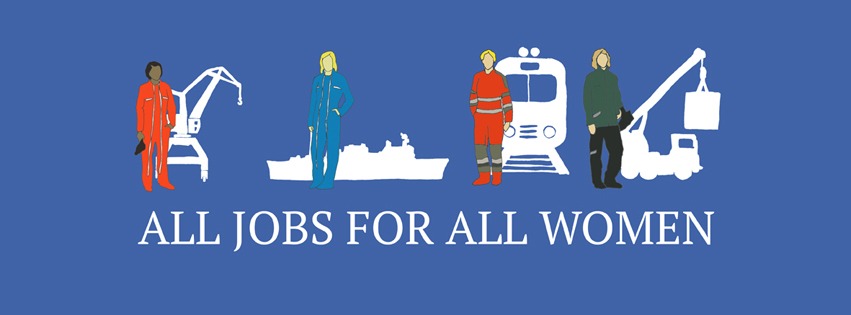
ADC Memorial continues its battle against any professional bans for women that deprive them of the right to choose their careers and restrict their right to labor. Discriminatory, gender-based restrictions lead to the systematic violation of women’s rights and impact various areas of life, making it difficult for women to achieve financial independence and, as a result, manage their lives as they see fit.
We call upon women to continue fighting for their rights and we support women who want to train for or hold jobs they have chosen for themselves instead of jobs that have been imposed on them by the state.









 Feedback
Feedback 

